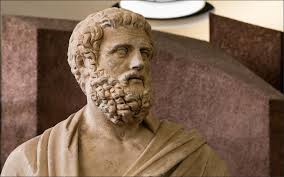|
Sophocles  Sophocles lived from c.496 to c.406 B.C., during the Golden Age of Athens (480-404 B.C.), the Greek city-state of which he was a citizen. He was an active citizen, participating in the city's infant democracy. He was involved in the war against the Samians and during the war became friends with Athens's popular general, Pericles. He founded the Thiasos of Muses (a society for the advancement of music and literature), and was an ambassador to many foreign countries throughout his lifetime. He was also a priest of the healing god Amynos and kept the sacred snake representing the god Aeschulapius while his temple was being built. He was a very well-rounded citizen, not only leading an active political and religious life but also writing one hundred and twenty-three tragedies, of which only seven remain intact for modern readers. Sophocles was married to a woman named Nicostrata, with whom he had a son, Iophon; he also had a son (out of wedlock) with Theoris of Sicyon named Ariston. He studied music under Lamprus and tragedy under Aeschylus before writing his own tragedies. His was a wealthy family and powerful in political and religious affairs. Of his seven plays to survive, Oedipus Rex (Oedipus the King) (c. 430 B.C.), Oedipus at Colonus (c. 404 B.C.), and Antigone (c. 442 B.C.), comprise the "Theban Trilogy," three plays which deal with King Oedipus's tragic fall from power and the ruin of his children. Sophocles also wrote Ajax (c. 450 B.C.), Trachiniae (The Women of Trachis) (440 B.C.), and Electro and Philoctetes (both c. 409 B.C.). The titles of ninety other Sophoclean dramas survive, including Triptolemos, which was honored at the dramatic competition the Great Dionysia c. 468 B.C., when Sophocles defeated his onetime mentor Aeschylus. In Antigone, the title character asserts that the laws of Zeus and "unwritten law" justify her burial of her brother, Polyneices. The popular general Pericles himself addressed the issue of unwritten law. To many scholars the play was Sophocles's message to Pericles on the dangers of authoritarian rule, and the playwright's assertion of the general's need to remain conscious of his duty to the citizens of Athens. It was the duty of playwrights in Athens to address social and political issues, and this play not only addresses authoritarian rule, but also familial duty and the status of women in society. When Antigone stands up to Creon she not only defies the edict, but also the traditional behavior of Greek women of the time. During the Golden Age of Athens, Sophocles was one of the city's most prolific and beloved playwrights. Antigone is still performed all over the world, and though it may seem different in theme and structure to modern works, it continues to move audiences just at it did when it was first produced. Many scholars have remarked on Sophocles's ability to create dramatic, complex, and unique characters and situations, all of which have withstood the passage of time.
 
|